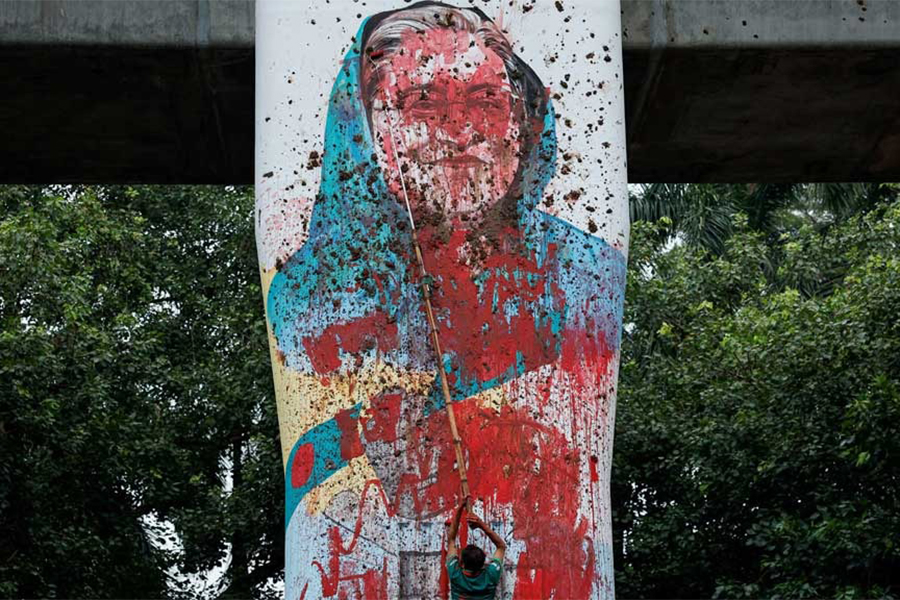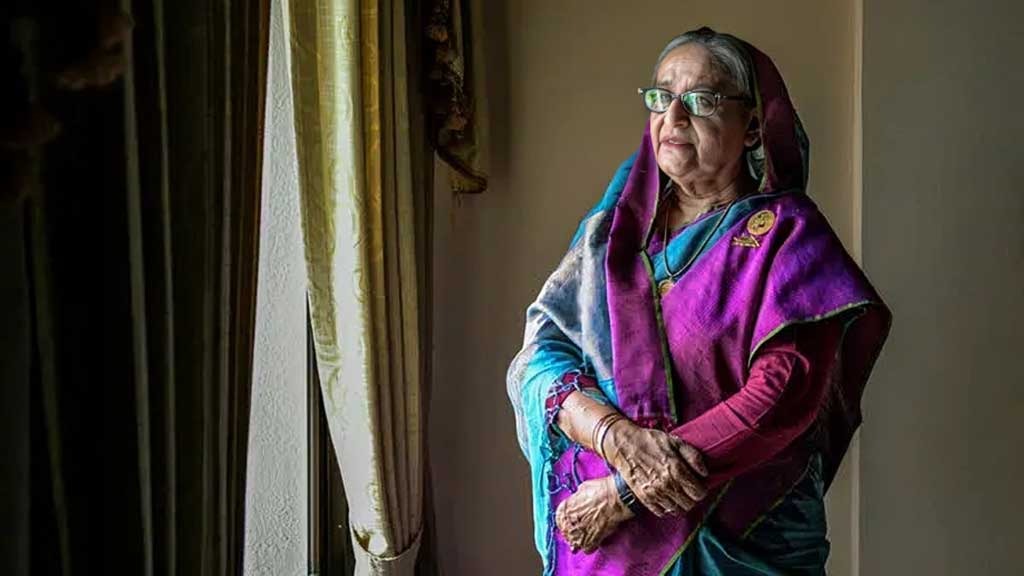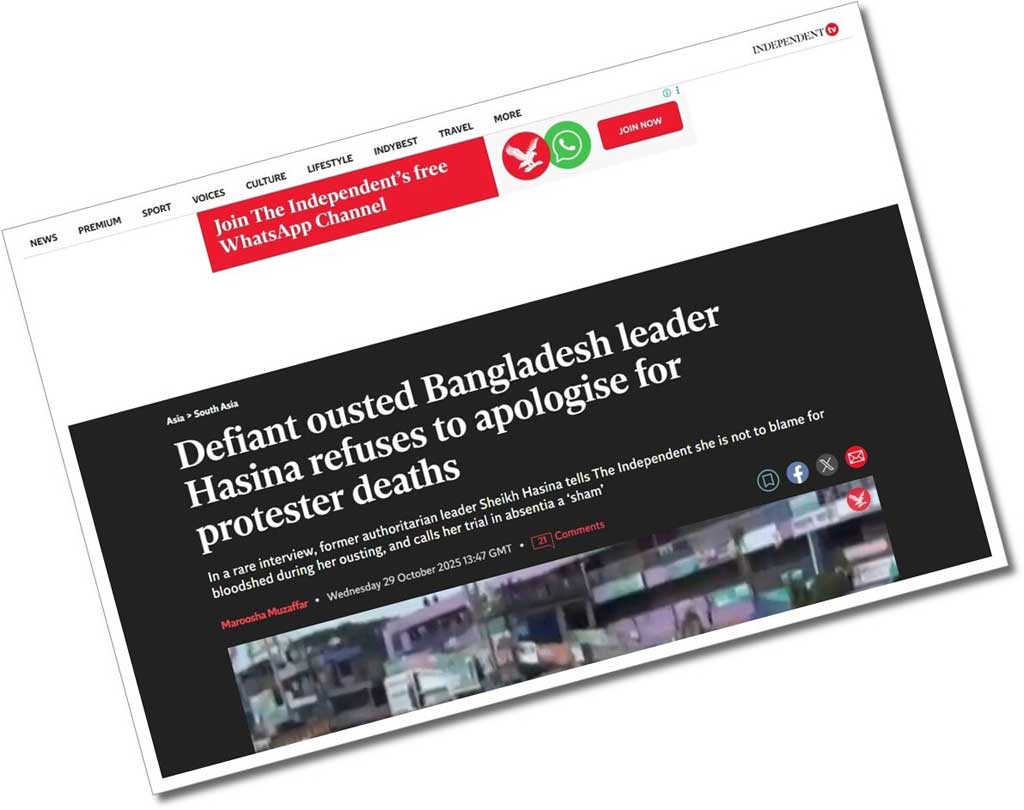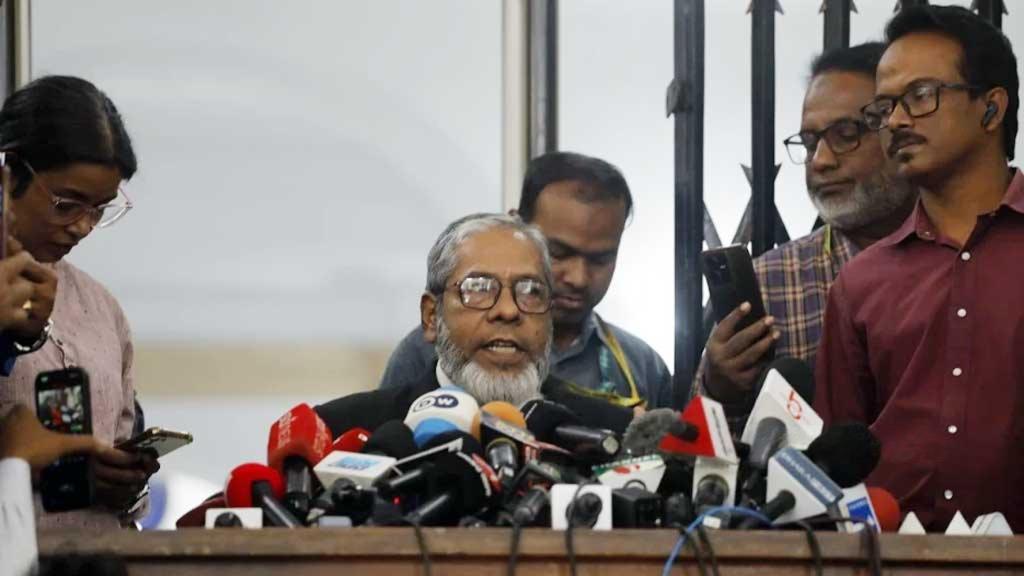Hasina offers no apology for July crackdown deaths
She labels charges ‘political’

Published :
Updated :

Ousted prime minister Sheikh Hasina has “refused to apologise” over the deaths during the crackdown on the July Uprising, and in turn, criticised the proceedings at the International Crimes Tribunal (ICT).
In an interview with The Independent, Hasina said she would “neither be surprised nor intimidated” if she were sentenced to death, describing the ICT proceedings as “a sham trial driven by political vengeance”.
The prosecution has sought the death penalty for Hasina on five charges: instigating, provoking and directing the killing of 1,400 people during July–August 2024, alleging “superior command responsibility” and involvement in a “joint criminal enterprise”.
The British daily reported that when asked if she would apologise to the families of protesters killed during the Uprising, Hasina said: “I mourn each and every child, sibling, cousin and friend we lost as a nation. I will continue to offer my condolences.”
Hasina rejected allegations that she had ordered police to fire on demonstrators.

She described the protests as a “violent insurrection” and claimed she bore no personal responsibility for the killings.
“As a leader, I ultimately take leadership responsibility, but the claim that I ordered or wished for the security forces to open fire on the crowds is simply wrong,” she said, adding that the high number of deaths was due to “breakdowns in discipline among security forces on the ground”.
Hasina fled to India on Aug 5, 2024 after being ousted in the Uprising, ending more than 15 years in power.
The verdict in the crimes against humanity case is due on Monday.
During the tribunal hearings, Chief Prosecutor Tajul Islam said Hasina had “confirmed” in conversations with three people that she directed security forces to use “lethal weapons” against protesters.
“She [Hasina] ordered killings by identifying locations through drones so that shots could be fired from helicopters. She assured Hasanul Haq Inu that para-commandos would be deployed in Narayanganj from helicopters, with ‘bombing’ from above, with ‘paratroopers’ descending,” he added.
Audio of Hasina’s alleged conversations with JaSaD President Inu, former Dhaka mayor Sheikh Fazle Noor Taposh and former Dhaka University vice-chancellor ASM Maksud Kamal was played in court.
A July BBC report said it had “verified” an audio tape suggesting Hasina “approved” the use of lethal force by security agencies to suppress the student movement.
Amnesty International Deputy Regional Director for South Asia Babu Ram Pant said at the time, “The rising death toll is a shocking indictment of the absolute intolerance shown by the Bangladeshi authorities to protest and dissent.”
UN human rights chief Volker Türk called attacks on protesters “shocking and unacceptable”.
A UN human rights investigation team visited Bangladesh last September at the request of the interim government led by Muhammad Yunus.
Its February report said several major killing operations during the July movement took place “under the instruction and supervision” of Hasina.
The report claimed security forces “deliberately and illegally” killed or maimed protesters, including instances of close-range shootings.
It estimated over 1,400 deaths between Jul 1 and Aug 15, mostly from lethal weapons issued to law enforcers.
Hasina disputed the 1,400-death toll in the interview, calling it “inflated” and “useful to the ICT for propaganda purposes”.
She insisted her government had acted “in good faith... to minimise the loss of life” and maintained that decisions during the unrest were made by “security personnel on the ground who were expected to follow well-established operational guidelines”.

“It may well be that in a febrile atmosphere some decisions were made that were mistaken,” she added.
Defending her decision to leave the country on Aug 5 last year, she told The Independent: “Staying would not only have put my life in danger, but also the lives of those around me.”
In a recent interview with India’s The Hindu, Hasina said “mistakes” were “certainly made” by security forces while responding to the “disordered situation” during last year’s Uprising.
"But what is being said is that I, as prime minister, was directing every step -- this is actually a misunderstanding of the security forces' procedures. I repeat, at no point did I authorise the security forces to shoot at the public," she added.
Following the tribunal’s arrest warrant, notices were issued in newspapers for the defendants’ appearance.
In an article published in The Week, Hasina claimed: “The charges were brought with no formal notice of proceedings by a compromised prosecution that has freely engaged in a trial by media, sharing confidential evidence that would prejudice proceedings in any other jurisdiction.”
In her latest BBC interview, Hasina said: "I'm not denying that the situation got out of control, nor that many lives were lost needlessly. But I never issued any order to fire on unarmed civilians.”
The interview also covered other serious allegations of abuses committed during Hasina's 15-year rule, which will be heard in another case at the special tribunal. She denies charges of crimes against humanity in that case too.
On reports of extrajudicial killings, she said: "This is denied in terms of my own involvement, but if there is evidence of abuse by officials, let us have it examined properly in an impartial, depoliticised process.”

WHAT HER LAWYER TOLD THE COURT
Hasina and former home minister Asaduzzaman Khan have been shown as fugitives under the law, requiring the tribunal to appoint counsel to represent them.
Advocate Amir Hossain appeared on their behalf.
On Oct 21, during defence arguments, Amir referred to an old interview of Ahmad bin Quasem Arman, son of former Jamaat leader Mir Quasem Ali, who criticised the 1973 International Crimes Act, saying it restricted proper use of evidence law and created barriers to fair trials.
Agreeing with Arman, Amir told the tribunal: “The Act does not allow the main Evidence Act. The CrPC cannot be applied. This is like tying someone’s hands and feet, throwing him into a river and asking him to swim.”
He disputed the claim that 1,500 protesters were killed and 2,500 injured during the July movement, saying only Abu Sayed had been killed.
The tribunal chairman replied: “No leaders were killed in 1971 either.”
Amir responded: “How would they be killed? They were in India.”
On “command responsibility”, he argued that even if the July movement was considered legitimate, “the state had the responsibility of control”.
Prosecution claims of killings in 52 districts, he said, did not match their witness list, which covered 15–20 districts.
The tribunal chairman replied, “The claim concerns widespread killings. Widespread killings can occur even in Dhaka.”
On quota reform protests, Amir argued that lawsuits were pending in the Appellate Division, meaning the administration could not intervene in the judiciary’s work.
The chairman replied: “Hearings can be held even in a day. The state has many switches at its disposal. They can keep them off or use them.”
Amir said protesters “misunderstood” Hasina’s remarks about “Razakar’s grandchildren”. Witnesses admitted under cross-examination that none of them were Razakar descendants.
The chairman said, “Razakar is an insult. It has been used as a slur for 54 years.”
Amir opposed describing the Awami League as “fascist”, arguing that its 15-year rule was a period of development, mentioning the Padma Bridge, the metro rail, the Dhaka Elevated Expressway and the Karnaphuli Tunnel.
He said errors in governance existed, as in other countries, but achievements should not be ignored.
“Iran’s Khamenei, Malaysia’s Mahathir have also faced such questions. You cannot highlight only what is wrong and ignore what is right,” he added.
On the alleged killings at Shapla Chattar, he said: “Hifazat-e Islam had entered Dhaka, vandalised the Paltan–Baitul Mukarram area, and felled large trees. Stun grenades were used to prevent them from harming the state.”
Responding to the prosecution’s claim of 30 deaths at Shapla Chattar, he said he was unsure whether 30 people had been killed.
The tribunal chairman noted that The Guardian and several other newspapers had reported on it.
Amir replied: “If something is true, it needs only one truth. If it is not true, 10 reports cannot make it true.”
He questioned the verification process of the phone conversations presented as evidence, saying: “These audios were tested only by CID. This is an international tribunal. They should have been tested internationally.”
The second senior judge said the BBC and Al Jazeera had already examined the recordings, asking why another institution was needed.
Amir replied: “Since the beginning of creation, when a kazi conducts a trial, a third, neutral witness is used for verification. It is the rule. But if the court wishes, it may rely on one opinion.”
The judge noted that the defence had not raised questions about deficiencies in the reports during cross-examination. “You could have made this point,” he said.
Amir replied: “I could have. Even if I did not, the court can still consider it.”
“We do not consider it,” the chairman said.
During a video shown in court about alleged helicopter gunfire, Amir said: “We see a helicopter flying. But we cannot tell who fired, who was hit, or whether anyone died.”
The second judge noted that the BNP and Jamaat-e-Islami activists had been described as “militants”.
Amir replied: “She did not call Jamaat-Shibir militants. Militants exist in the country. Militants may be in Jamaat. Hasina played a major role in tackling militancy. The UN has recognised that.”
He objected to the attorney general’s comments about bringing Hasina back to face trial, saying his client “did not flee” but was forced to leave.
Referring to BNP leader Tarique Rahman, he said: “For the same reason that person did not return, my client is not returning.”
After the tribunal announced the verdict date on Oct 31, Amir said he had presented the strongest arguments possible in her absence and hoped the tribunal would acquit her.
“I saw no discomfort in the conduct of the trial. No one blocked me. I tried my best within my limits. I received necessary documents from the state as required. I worked with what I was given.”


 For all latest news, follow The Financial Express Google News channel.
For all latest news, follow The Financial Express Google News channel.